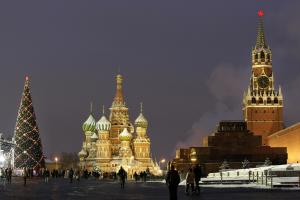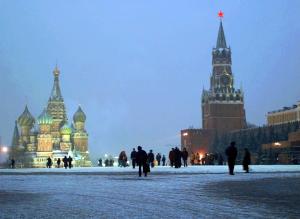MOSCOW (AP) — From a Western perspective, Vladimir Putin's days as president of Russia should be numbered: The ruble has lost about half its value, the economy is in crisis and his aggression in Ukraine has turned the country into an international pariah.
And yet most Russians see Putin not as the cause, but as the solution.
The situation as seen from a Russian point of view is starkly different from that painted in the West, and it is driven largely by state television's carefully constructed version of reality and the Kremlin's methodical dismantling of every credible political alternative.
An Associated Press-NORC Center for Public Affairs Research poll released Thursday found that 81 percent of Russians still support him, hours before Putin vowed in a live news conference to fix Russia's economic woes within two years, voiced confidence the plummeting ruble will recover soon and promised to diversify Russia's economy.
But the poll also showed that confidence in the economy is slipping. This is particularly true in Moscow, where people have become accustomed to imported goods and foreign travel, now once again off-limits for many because of the fall of the ruble and Western sanctions over Ukraine.
The poll was conducted between Nov. 22 and Dec. 7, when the ruble was steadily declining. But this week's catastrophic collapse is likely to have a much greater effect on consumer prices and the standard of living.
For Putin, the question is whether he will be able to convince Russians to tighten their belts, and not just for a few months but possibly for years to come.
"The Russian people have a sense that they are under sanctions, they are a fortress under siege," said Maria Lipman, an independent analyst. "This kind of mentality is disseminated consistently and steadily by Russian television: Who else is there to rely on except Putin? Putin is seen as the savior of the nation, and I think he sees himself in this fashion."
Putin addressed his countrymen's concerns over three hours at Thursday's news conference, sending a message that he's in charge and all will be fine.
View gallery

In this Thursday, Dec. 10, 2009 file photo people walk past a huge Christmas tree installed in Red S …
An advertisement before the news conference showed Putin surrounded by Sochi Olympic athletes, petting a baby tiger and greeting cosmonauts. "We are absolutely capable of doing everything ourselves," he promises the audience.
How Russians view Putin is associated with how they get their news, the poll showed. Those who identified state television as their main source of news are more likely to approve of Putin (84 percent) than those who have other sources (73 percent), while those who tune into the news often also have a more favorable opinion of him.
After becoming president in 2000, Putin benefited from high prices for oil, the mainstay of Russia's economy. In the past decade, Russians saw their living standards rise faster than at any other point in modern history, transforming many average citizens into car owners and globe-trotters for the first time ever.
The suppression of opposition politicians and independent media, widely criticized by outside observers, was tacitly accepted by many as a compromise worth making for economic stability after the roller coaster years of the 1990s.
"I very much support Putin — who else is there to support?" said Valentina Roshupkina, a 79-year-old resident of Gryaz, a town several hours' drive south of Moscow. "The country is moving in the right direction, I believe, because he lifted up the army, he made the government stronger. People started to be a little bit afraid of us."
Poll respondents were asked whether they would be willing to speak with an AP reporter, and Roshupkina was among the many who agreed.
With the Russian economy buffeted by Western sanctions and the fall in oil prices, Putin has relied even more on his image as a tough leader capable of standing up to the West. He appears to be betting that this will help him weather the economic storm.
So far he's been right: The presidency and the military are the country's most trusted institutions, according to the poll, with three out of four Russians saying they trust the presidency and two out of three expressing faith in the military.
"We've revived the army and that's very important," said Ivan Savenko, a 50-year-old driver in the southern city of Stavropol who also took part in the poll. "For us, the most important thing is the army and then everything else. It's important for us that our country is a power. If we are not a power, we do not exist."
Of those surveyed, 81 percent said they strongly or somewhat approve of the way Putin is handling his job, a dramatic increase of more than 20 percentage points from an AP-GfK poll conducted in 2012.
While Russia has become more authoritarian under Putin, the support for him appears genuine. The significant fluctuation in Putin's ratings in recent years also indicates that Russians feel able to respond freely in anonymous surveys about their views on the president. The 81 percent approval rating is only slightly higher statistically than the 74 percent measured during the same time period by the Levada Center, Russia's most respected independent pollster.
Many analysts question, however, whether the high ratings have any significance, given the Kremlin's control over information.
"There is a total, effective, monopolistic propaganda campaign, and if there is an information monopoly, how can you talk about ratings?" said Georgy Satarov, a former Kremlin adviser who heads a research institute that studies corruption.
"The thing you have to pay attention to is not the fact that 80 percent support him, but that despite that information monopoly 15 percent don't support him," he said.
Support for Putin soared after he moved to seize the Russian-speaking Crimean Peninsula from Ukraine in March.
"A source of pride for the overwhelming majority of Russians is the victory of World War II, but that was already 70 years ago," Lipman said. "(In Crimea) Putin gave the sense that we are victorious and triumphant and resurgent today."
View gallery

In this Friday, March 20, 1998 file photo people walk along Moscow's Red Square with St. Basil C …
The Russia-backed separatists who took up arms against government troops in eastern Ukraine also have been portrayed as heroes on state television. Of the Russians polled, 69 percent said that many or some parts of Ukraine rightfully belong to Russia.
But some, like 37-year-old librarian Yelena Shevilyova, said that although she approves of Putin, she believes Russia's involvement in Ukraine may have come at too high a cost.
"I think we lost a lot in our lives because of this," said Shevilyova, another poll participant, referring to Crimea.
"I think that it is right to bring all of these (Russian-speaking regions) back, but we need everything to be good here too. ... You can't have everything at once," she said, speaking from the far northern region of Perm.
Growing worries about a worsening economy and the impact of sanctions are more keenly felt in major cities. In Moscow, more than 6 in 10 said they had been negatively affected by the sanctions and most said their family's finances were worse than three years ago. Less than half felt that way elsewhere.
"I am afraid that Russia isn't going anywhere," said Dmitry Uryupin, 48, a sound director in a small production firm in Moscow who was among those surveyed. "It's unlikely that wages will be raised. In fact, it's quite likely the opposite will happen, unemployment will rise and it will all affect the most economically insecure people as well as us, the creative class."
After Putin was inaugurated for a third term in 2012 after a wave of protests in Moscow driven by the creative class, he clamped down even harder on the opposition and focused on his core electorate: people in the provinces and those more dependent on the state for their income.
The disgruntled in Moscow have proved easy to discredit in the eyes of what is known as the Putin majority: "Look at these poor Muscovites. ... Oh my God, they complain because they cannot go to Italy on vacation and they can no longer afford to buy Parmesan cheese!" Lipman said.
Whether discontent not just with the economy but with Putin's leadership will grow, Lipman said, depends on "how badly this will hurt, and for how long."
The AP-NORC Center poll of Russia was conducted by NORC at the University of Chicago with fieldwork for the in-person survey by GfK Russia from Nov. 22-Dec. 7. It is based on 2,008 in-person interviews with a nationally representative random sample of Russians age 18 and older.
Funding for the survey came from NORC at the University of Chicago.
Results for all adults have a margin of sampling error of plus or minus 2.4 percentage points.
___
Online:
AP-NORC Center for Public Affairs Research: http://www.apnorc.org